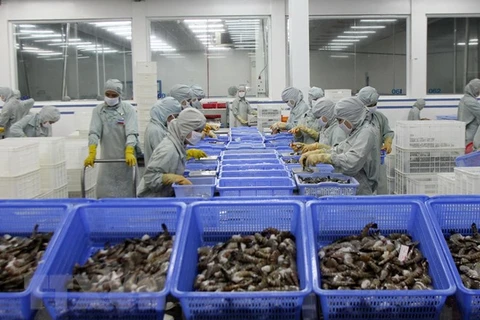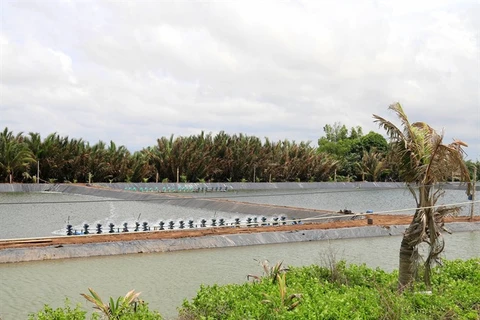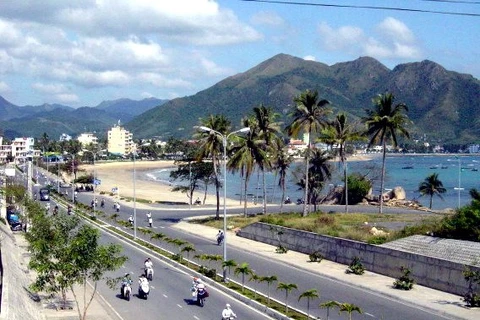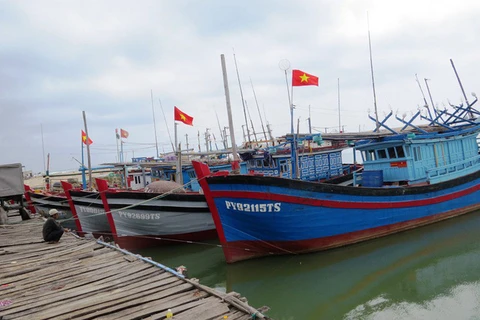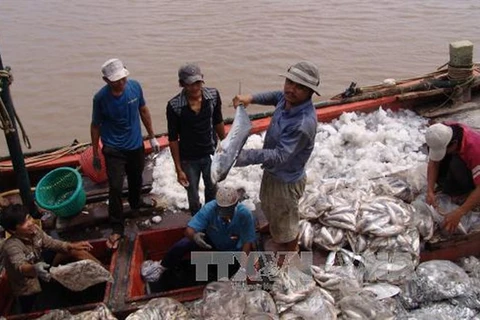Ben Tre (VNA) - The Mekong Delta province of Ben Tre plans to develop its aquaculture areas to 47,000ha with an annual output of 300,000 tonnes of aquatic species in the 2018-2020 period.
Of the figure, 40,200ha will be saltwater and brackish water aquaculture areas and the remaining freshwater aquaculture, under a new fishery development plan to 2030.
The province also targets expanding its aquaculture area to 50,000ha in the 2021-2030 period.
Nguyen Huu Lap, Vice Chairman of the provincial People’s Committee, said the province would restructure breeding methods and kinds of aquatic species to suit the province’s natural conditions and adapt to climate change.
The province will focus on advanced farming techniques for aquaculture to increase yield and quality.
In freshwater areas, the province will stabilise its tra fish farming area and breed other traditional fresh water fish species to increase income for local households.
In saltwater and brackish water areas, the province will continue developing the farming of key aquatic species like white-legged shrimp, black-tiger shrimp, bivalve molluscs and brackish water fish.
The province will set up concentrated aquaculture areas that breed aquatic species under Good Agricultural Practice (GAP) for exports.
The province has more than 46,500ha of aquaculture, including 11,500ha of semi-intensive and intensive shrimp farming. according to the province’s Department of Agriculture and Rural Development.
It has concentrated farming areas for white-legged shrimp and black-tiger shrimp in the coastal districts of Ba Tri, BinhDai and Thanh Phu.
It also has 39 establishments that produce aquatic species fries or breed aquatic species, on a total area of 8,120ha under high quality standards like VietGAP, GlobalGAP, Aquaculture Stewardship Council (ASC) and Marine Stewardship Council (MSC) standards.
Bui Van Lam, Director of the Department of Agriculture and Rural Development, said the province targets having 10 percent of intensive shrimp farming areas to be bred under GAP standards or equivalent standards.
Many seafood co-operatives in the province are operating successfully.
The Rang Dong Seafood Cooperative in Binh Dai district’s Thoi Xuan commune, for instance, has nearly 9,690 members who manage, breed and exploit clams on a total area of nearly 1,600ha in Chai Muoi and Thoi Muoi islets.
Pham Van Thuan, director of the cooperative, said the cooperative had harvested more than 1,290 tonnes of clams with revenue of 33 billion VND (1.4 million USD) in the first eight months of the year.
The clams have been granted Marine Stewardship Council (MSC) certification and exported to many countries.
The province has 13 modern seafood processing plants that can process up to 150,000 tonnes of seafood a year. The plants process mostly shrimp, tra fish and clams.-VNA
Of the figure, 40,200ha will be saltwater and brackish water aquaculture areas and the remaining freshwater aquaculture, under a new fishery development plan to 2030.
The province also targets expanding its aquaculture area to 50,000ha in the 2021-2030 period.
Nguyen Huu Lap, Vice Chairman of the provincial People’s Committee, said the province would restructure breeding methods and kinds of aquatic species to suit the province’s natural conditions and adapt to climate change.
The province will focus on advanced farming techniques for aquaculture to increase yield and quality.
In freshwater areas, the province will stabilise its tra fish farming area and breed other traditional fresh water fish species to increase income for local households.
In saltwater and brackish water areas, the province will continue developing the farming of key aquatic species like white-legged shrimp, black-tiger shrimp, bivalve molluscs and brackish water fish.
The province will set up concentrated aquaculture areas that breed aquatic species under Good Agricultural Practice (GAP) for exports.
The province has more than 46,500ha of aquaculture, including 11,500ha of semi-intensive and intensive shrimp farming. according to the province’s Department of Agriculture and Rural Development.
It has concentrated farming areas for white-legged shrimp and black-tiger shrimp in the coastal districts of Ba Tri, BinhDai and Thanh Phu.
It also has 39 establishments that produce aquatic species fries or breed aquatic species, on a total area of 8,120ha under high quality standards like VietGAP, GlobalGAP, Aquaculture Stewardship Council (ASC) and Marine Stewardship Council (MSC) standards.
Bui Van Lam, Director of the Department of Agriculture and Rural Development, said the province targets having 10 percent of intensive shrimp farming areas to be bred under GAP standards or equivalent standards.
Many seafood co-operatives in the province are operating successfully.
The Rang Dong Seafood Cooperative in Binh Dai district’s Thoi Xuan commune, for instance, has nearly 9,690 members who manage, breed and exploit clams on a total area of nearly 1,600ha in Chai Muoi and Thoi Muoi islets.
Pham Van Thuan, director of the cooperative, said the cooperative had harvested more than 1,290 tonnes of clams with revenue of 33 billion VND (1.4 million USD) in the first eight months of the year.
The clams have been granted Marine Stewardship Council (MSC) certification and exported to many countries.
The province has 13 modern seafood processing plants that can process up to 150,000 tonnes of seafood a year. The plants process mostly shrimp, tra fish and clams.-VNA
VNA

